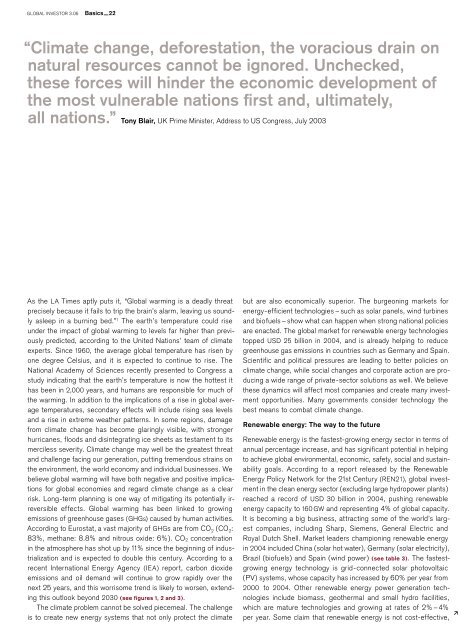Banking for 7 billion and 7 million
New challenges and opportunities of globalization Global Investor, 03/2006 Credit Suisse
New challenges and opportunities of globalization
Global Investor, 03/2006
Credit Suisse
You also want an ePaper? Increase the reach of your titles
YUMPU automatically turns print PDFs into web optimized ePapers that Google loves.
GLOBAL INVESTOR 3.06 Basics — 22<br />
“Climate change, de<strong>for</strong>estation, the voracious drain on<br />
natural resources cannot be ignored. Unchecked,<br />
these <strong>for</strong>ces will hinder the economic development of<br />
the most vulnerable nations first <strong>and</strong>, ultimately,<br />
all nations.” Tony Blair, UK Prime Minister, Address to US Congress, July 2003<br />
As the LA Times aptly puts it, “Global warming is a deadly threat<br />
precisely because it fails to trip the brain’s alarm, leaving us soundly<br />
asleep in a burning bed.” 1 The earth’s temperature could rise<br />
under the impact of global warming to levels far higher than previously<br />
predicted, according to the United Nations’ team of climate<br />
experts. Since 1960, the average global temperature has risen by<br />
one degree Celsius, <strong>and</strong> it is expected to continue to rise. The<br />
National Academy of Sciences recently presented to Congress a<br />
study indicating that the earth’s temperature is now the hottest it<br />
has been in 2,000 years, <strong>and</strong> humans are responsible <strong>for</strong> much of<br />
the warming. In addition to the implications of a rise in global average<br />
temperatures, secondary effects will include rising sea levels<br />
<strong>and</strong> a rise in extreme weather patterns. In some regions, damage<br />
from climate change has become glaringly visible, with stronger<br />
hurricanes, floods <strong>and</strong> disintegrating ice sheets as testament to its<br />
merciless severity. Climate change may well be the greatest threat<br />
<strong>and</strong> challenge facing our generation, putting tremendous strains on<br />
the environment, the world economy <strong>and</strong> individual businesses. We<br />
believe global warming will have both negative <strong>and</strong> positive implications<br />
<strong>for</strong> global economies <strong>and</strong> regard climate change as a clear<br />
risk. Long-term planning is one way of mitigating its potentially irreversible<br />
effects. Global warming has been linked to growing<br />
emissions of greenhouse gases (GHGs) caused by human activities.<br />
According to Eurostat, a vast majority of GHGs are from CO 2 (CO 2 :<br />
83%, methane: 8.8% <strong>and</strong> nitrous oxide: 6%). CO 2 concentration<br />
in the atmosphere has shot up by 11% since the beginning of industrialization<br />
<strong>and</strong> is expected to double this century. According to a<br />
recent International Energy Agency (IEA) report, carbon dioxide<br />
emissions <strong>and</strong> oil dem<strong>and</strong> will continue to grow rapidly over the<br />
next 25 years, <strong>and</strong> this worrisome trend is likely to worsen, extending<br />
this outlook beyond 2030 (see figures 1, 2 <strong>and</strong> 3).<br />
The climate problem cannot be solved piecemeal. The challenge<br />
is to create new energy systems that not only protect the climate<br />
but are also economically superior. The burgeoning markets <strong>for</strong><br />
energy-efficient technologies – such as solar panels, wind turbines<br />
<strong>and</strong> biofuels – show what can happen when strong national policies<br />
are enacted. The global market <strong>for</strong> renewable energy technologies<br />
topped USD 25 <strong>billion</strong> in 2004, <strong>and</strong> is already helping to reduce<br />
greenhouse gas emissions in countries such as Germany <strong>and</strong> Spain.<br />
Scientific <strong>and</strong> political pressures are leading to better policies on<br />
climate change, while social changes <strong>and</strong> corporate action are producing<br />
a wide range of private-sector solutions as well. We believe<br />
these dynamics will affect most companies <strong>and</strong> create many investment<br />
opportunities. Many governments consider technology the<br />
best means to combat climate change.<br />
Renewable energy: The way to the future<br />
Renewable energy is the fastest-growing energy sector in terms of<br />
annual percentage increase, <strong>and</strong> has significant potential in helping<br />
to achieve global environmental, economic, safety, social <strong>and</strong> sustainability<br />
goals. According to a report released by the Renewable<br />
Energy Policy Network <strong>for</strong> the 21st Century (REN21), global investment<br />
in the clean energy sector (excluding large hydropower plants)<br />
reached a record of USD 30 <strong>billion</strong> in 2004, pushing renewable<br />
energy capacity to 160 GW <strong>and</strong> representing 4% of global capacity.<br />
It is becoming a big business, attracting some of the world’s largest<br />
companies, including Sharp, Siemens, General Electric <strong>and</strong><br />
Royal Dutch Shell. Market leaders championing renewable energy<br />
in 2004 included China (solar hot water), Germany (solar electricity),<br />
Brazil (biofuels) <strong>and</strong> Spain (wind power) (see table 3). The fastestgrowing<br />
energy technology is grid-connected solar photovoltaic<br />
(PV) systems, whose capacity has increased by 60% per year from<br />
2000 to 2004. Other renewable energy power generation technologies<br />
include biomass, geothermal <strong>and</strong> small hydro facilities,<br />
which are mature technologies <strong>and</strong> growing at rates of 2% – 4%<br />
per year. Some claim that renewable energy is not cost-effective,

















